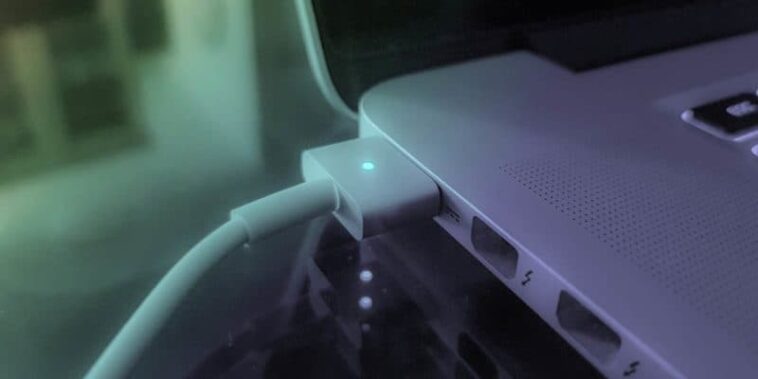Laptop batteries are made of either Lithium Polymer (LiPo) or standard Lithium-Ion (Li-ion). These batteries are designed in such a way that you cannot “overcharge” it. If you are wondering about can I leave my laptop plugged in Overnight; then this article will help you through with it. Can I leave my laptop plugged in overnight?
These batteries do not suffer from memory effects, which is common to nickel-based cells. This means that these batteries will not be affected by recharging and discharging.
In a layman’s language, if you charge your laptop battery to 100% and leave the charger plugged in; the charger will automatically stop charging the battery.
Can I Leave My Laptop Plugged in Overnight
The laptop is designed in such a way that it will stop charging the battery. In other words, the device will directly turn off the power cable after the laptop has used the battery for some time.
The charger will again start charging to top up the applied power. Therefore, you can leave your laptop plugged in overnight. And it will not run the risk of damaging the battery.
However, with time the laptop battery will wear down. The more the number of charge cycles that you expose your laptop battery to, the more the battery will wear down. Different cells have different charge cycles. But generally speaking, there is a minimum of 500 full battery charge cycles.
Until the recent past, it was considered dangerous to leave your laptop plugged in. That is because most of the batteries were using nickel-based. But, the current Lithium-based batteries leaving the laptop connected to the external power source have no serious effects.
Storing your battery with a full battery is terrible for battery life. Either, using your laptop battery until it is empty every time you use your laptop is also bad for your battery life.
Therefore, it is advisable if you want to store your computer then leave it with 50% power. Also, ensure that you store your laptop in a cool place. That is crucial because high temperatures are detrimental to the laptop battery.
What makes lithium batteries explode?
One thing that is very common with Lithium based laptop batteries is that they are unstable. From the moment they are manufactured, they start to lose capacity. But some factors hasten their damage level, and these are:
- High temperature – when the temperature is above 30 degrees Celsius it can cause severe and irreparable damage to the battery.
- Discharge and charge cycles – with several cycles that can be recharged and discharged. Generally speaking, most batteries have charge and discharge cycles of 500.
- Level of voltage – the higher level of voltage that is using it to charge the battery is the smaller the life span of the battery. The voltage level used to charge the battery is measured in volts per cell.
How does heat affect a laptop battery?
While leaving your laptop plugged in overnight might not damage the battery. But, excess heat is injurious to battery health. When the processor of the computer is running, higher levels of heat are produced.
Also, when different programs are running at the same time or when you are playing computer games, which makes the processor runner, even more, it will increase the heat production by the laptop.
If you realize that your laptop is overheating due to continuous use, ensure that you disconnect the battery. Once you have removed the battery, please keep it in a cool place to prevent the heat from destroying the cell.
As already mentioned above, when the temperature is higher than 30 degrees Celsius, it will negatively affect the life span of the battery. Simply put, it is detrimental to your laptop battery is you leave your laptop inside your car during summer.
When the high temperature is combined with a high voltage level, it even shortens the life span of the battery further. Most importantly, remember that a high temperature does not refer only to the surrounding environment. It also relates to processes in the laptop that are likely to increase the temperature of the computer, such as a running processor.
The voltage level of the laptop battery
Lithium-based laptop batteries usually charge at volts per cell of around 4.20. This voltage is equivalent to a 100% capacity of the battery. At this voltage level, the battery will have between 300 to 500 charge and discharge cycles.
For every 0.10 volts per cell that the battery loses, it doubles the number of discharge cycles that the battery will have. That will continue until the maximum level of 3.90 volts per cell is reached. It will translate to between 2400 and 4000 discharge cycles.
However, at this level, the battery can only be charged up to around 60%. In total, the runtime will be higher than half the fully charged battery.
What will happen if you leave your laptop plugged in?
According to Battery University, when you leave your laptop plugged in, instead of the battery continuing to suck in power, the battery will bypass the power when it is fully charging.
This means that any extra power that is coming from an external source is directly utilized in powering the laptop instead of the energy first passing through the battery.
Besides that, you might have noticed when your laptop is plugging in; there is excess heat that comes out. This heat is the byproduct of continuous charging.
Note that the excess heat is produced for long; it is likely to cause severe and permanent damage to the battery.
Moreover, Battery University further explains that if the temperature of the laptop is high and you leave it plugged in continuously, then this will significantly affect your battery life. If your computer gets overheated quickly, then it is not advisable to leave it plugged in after it is fully charged.
Instead, if you notice that your laptop is overheating, then remove the battery and allow it to cool off. The good news is that you can remove the laptop battery and plug in the charger and continue using the laptop. It will rely on incoming power instead of battery power.
Calibration of laptop battery
If your laptop is using a lithium-ion battery, then it is advisable to avoid discharging it completely before fully recharging it. This cycle is known as the deep-cycle, and it is only recommended for nickel-metal hydride and nickel-cadmium batteries.
However, it is advisable to perform a deep calibration of the laptop battery once per month. This is referred to as recalibrating the battery. When you recalibrate the battery, it enables you to monitor the battery mechanics.
Also, it will allow the battery to remain accurate when it is displaying the charge level and battery life.
Care for a laptop battery
For you to successfully carry out the battery calibration, ensure that you charge your laptop’s battery to full capacity. After that, allow the laptop to sit for two hours for it to cool off from the charging process.
Ensure that you unplug the charger, and then set the power save settings of your computer from hibernating once the battery charge level reaches 5%. When your laptop starts to sleep, leave it undisturbed for 5 hours.
Next, plug in the charger and allow your laptop to charge to full capacity. Make sure that you do not disturb the laptop while it is charging.
Is it possible to prolong the battery life?
No matter how well you care for your laptop’s battery. It is inevitable that it will naturally decline in its performance. However, when you charge the battery to its maximum level per cell, you can get the maximum number of recharge cycles.
Similarly, if you lower the voltage level of the battery, it can help to little bit prolong the battery life.
Conclusion
Does leaving your laptop plugged in overnight affect the battery? Not, however, recharging your battery will daily. Also, if we leave the laptop plugged in overnight will not result? Still, if you charge using an AC power, the battery life will be significantly reduced; if you use it continuously for one year.
So, the best way to care for your laptop’s battery is to use the battery power until it is half used and then plug it in. And most importantly, ensure that you do not use high voltage power to charge the battery, and you do not allow it to get overheated.
Moreover, as far as laptop batteries are concerned:
You cannot overcharge a laptop battery. Therefore, there is no danger in leaving your laptop plugged in overnight. That is because as soon as the battery is 100% charged, it will automatically stop charging. It will not start recharging until the power is used.






